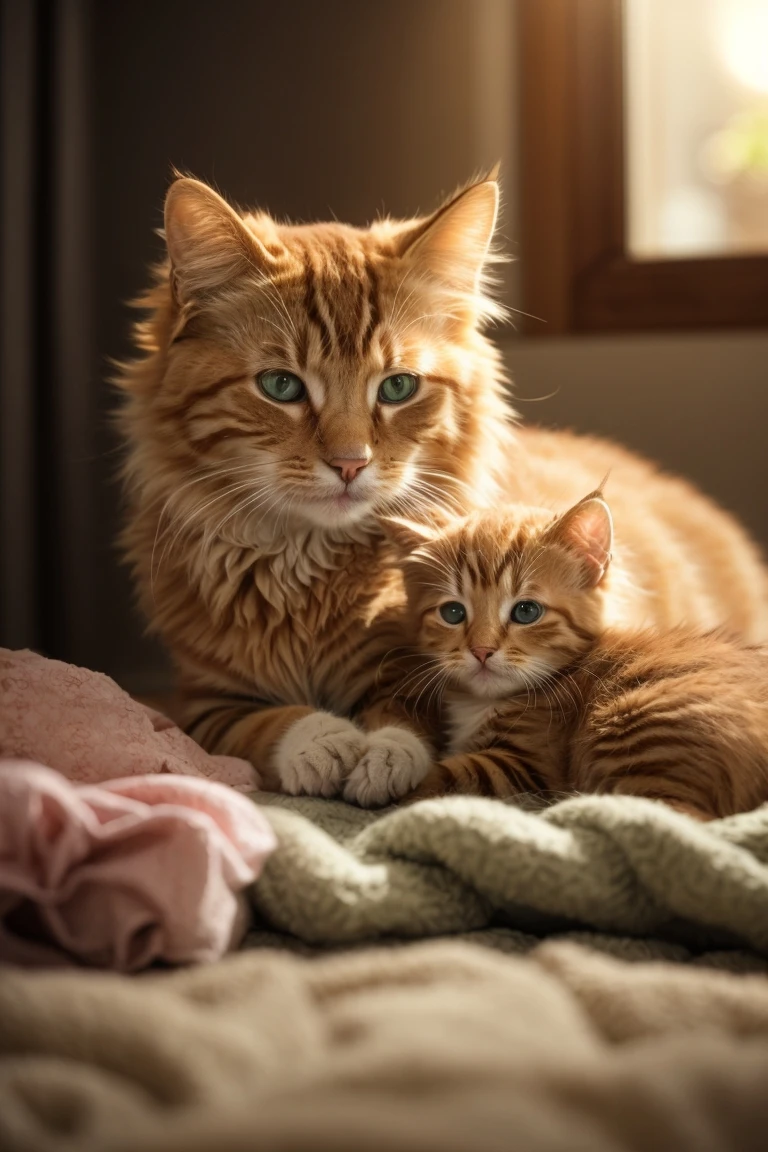The Role of the Mother Cat in Caring for Newborn Kittens

The arrival of a new litter of kittens is an exciting time. But it can also be nerve-wracking, especially for first-time cat owners. While tempting to dive in and help, it's important to understand the vital role the mother cat plays in caring for her young. From pregnancy through weaning, the queen provides essential care kits would not survive without. Understanding her maternal behaviors and needs allows you to support her critical job.
Pregnancy and Preparing for Birth
A cat's mothering journey begins even before birth, as her body prepares to nourish developing kittens.
Changes in a pregnant cat:
- Enlarged, distended abdomen
- Enlarged nipples
- Increased appetite in mid-pregnancy
- Decreased appetite and restless behavior as birth nears
- Nesting behaviors like kneading and vocalizing
Provide ample food, gentle exercise, litterbox access, and nesting areas during this time. Monitor for potential birthing complications requiring emergency vet care.
The Birthing Process
When labor begins, her instinctive programming kicks in:
Early labor signs:
- Restlessness, hiding, loss of appetite
- Enlarged mammary glands
- Drop in body temperature below 100°F
Active labor:
- Strong, frequent contractions every 5-30 minutes
- Nesting behavior intensifying
- Vocalizing during contractions
- Water breaking and discharge
Birth:
- Delivers kittens every 20-60 minutes
- Licks kittens to dry and stimulate breathing
- Chews umbilical cord
- Consumes placental fluids and tissues
Completed labor:
- Delivers all kittens naturally (avg 3-5 kittens)
- Licks genitals to stimulate urination/defecation
- Settles in comfortably with kittens nursing
Contact your vet if you have any concerns about the birthing process or labor lasts over 24 hours.
Caring for Newborns (0-2 weeks)
In their first weeks of life, newborn kittens are completely dependent on mom for survival.
Mom's key jobs caring for newborns:
- Keeping kittens warm and regulating their body temperature
- Allowing kittens to nurse frequently to stimulate milk production and supply key antibodies
- Grooming kittens to stimulate bowel/bladder function until they can on their own
- Protecting against potential threats to vulnerable young
Signs of healthy newborns include:
- Nursing every 1-2 hours, belly full of milk
- Pink skin, steady breathing, and plump, round tummies
- Being very sleepy between nursing
- Eliminating waste regularly when mom grooms
Leave mom undisturbed to focus on her critical nurturing role unless you observe signs requiring veterinary intervention.
Providing Nutrition and Elimination Assistance (2-4 weeks)
As kittens grow, the queen continues diligent care:
Feeding:
- Provides milk high in fat, calories, and nutrients
- Lettting kittens nurse frequently on demand
- May supplement nursing with regurgitated solid foods
Elimination:
- Continues grooming genitals to stimulate bowel movements
- Consumes excrement to keep nest clean
By 2-3 weeks, kittens sleep less and interact more with litter mates. Eyes open around 7-10 days. The queen supervises weaning explorations.
Socialization and Weaning Support (4-8 weeks)
Around 4 weeks, the queen's role shifts towards weaning kittens and teaching cat social skills:
Weaning:
- Introduces kittens to solid foods - mushy, kitten-formulated canned foods or gruel
- Begins refusing nursing and leaving nest more to encourage independence
- Monitors food intake and litterbox use
Socialization:
- Models proper cat behaviors and manners, like grooming and using the litterbox
- Allows supervised interaction with litter mates
- Gently corrects play that gets too rough
Kittens nurse occasionally for comfort, but nutrition shifts to solid foods. By 8 weeks, kittens are ready for adoption.
Providing the Best Care for a Nursing Cat
To support the mother's demanding role:
- Ensure she's eating kitten food - very high calorie and calcium
- Bring food, water and litter to her for easy access
- Give her a calm, comfortable birthing area away from other pets
- Avoid handling newborns to prevent distressing mom
- Have the vet examine kittens within 48 hours for health
- Spay the mother cat once kittens are weaned to avoid back-to-back litters
With your support and her amazing maternal instincts, the queen can raise happy, healthy, well-socialized kittens ready for their new homes.
When to Call the Veterinarian
Contact your vet promptly if:
- You observe serious birthing difficulties or prolonged labor
- Mom shows signs of illness like lethargy, fever, vomiting or diarrhea
- Kittens are not nursing regularly, seem inactive, or have diarrhea
While the mother cat's care is ideal, complications can arise requiring medical intervention. Close monitoring means providing the best care for mom and her kittens.
A mother cat's devotion to her young is incredible to witness. Appreciating all she provides offers you the knowledge to support her vital efforts. With your help, she can feel secure to focus on the critical, life-shaping care only a cat mom can provide.